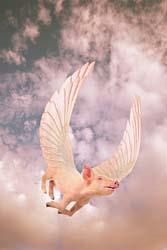By Guest Blogger Annie Eagle
(after the year of the pig)

In
Now that the Year of the Pig has just ended, I wish to consider the reputation and treatment of this lowly and most serviceable animal.
In the Orient, the Pig has an honoured place in the Chinese Calendar. This Year of the Pig ended a 60 year cycle, so was known as the Year of the Golden Pig. It was seen as an especially auspicious year. Orientals believe that those who are born in a Pig year will have a good life, as reflected in the Vietnamese proverb ‘Tuoi Hoi nam doi ma an’
People born in the Year of the Pig are said to have the attributes of honesty, patience, generosity, courage & even nobility, and, an admirable belief in the perfectibility of mankind(!)
In one of the many variations of the Animal Zodiac story, each of the 12 animals was called before its peers and had to explain why it deserved a position at the top. The Boar, at a loss, proceeded to claim that the meat on its bones “tasted good“. This explanation was apparently considered unsatisfactory, because the Boar was placed at the very end of the Zodiac.
Although Moslems and Jews regard pigs as ‘unclean’, pork has become the meat of preference for the Oriental palate, principally in
As a European residing in
My daily wake-up call around 4am, in the grey light of dawn, was the sound of a man hacking up freshly-slaughtered pig carcasses with a cleaver. Every morning he would roll up with three of them slung across the back seat of his motorbike, cloven in half from snout to tail, trotters jiggling obscenely in the half-light. All skinned & pink, looking vaguely human, The man threw them down on a tarp on the ground, & proceeded to butcher them. A grisly sight. By 5am they were all skillfully & systematically reduced to ‘cuts’ of meat, around which a small crowd of shoppers would gather; by 7 or 8am the whole lot had been sold, the tarp was empty & the man packed up & left. This would repeat itself again the next day, & the next…..
Every morning three pigs, three pigs, three pigs….. I often thought of that other very English expression ‘ If pigs could fly…….. with the extension ‘they probably would!’
No matter how many times I heard the chopping, my horror of it never quite dissipated. Even if I did not see it, there was an inevitable visual association, with the accompanying thought of the animals’ death. A constant reminder to me of the Buddhist Wheel of Life & Death & the daily suffering of animals, at human hands.
This became more poignant for me, just before Tet, which I spent in a village, in a very rural part of northern
However, the killing & eating of pigs, along with many other animals, is simply a matter of fact here in
Pigs still run wild in the forests of
This animal was once revered, even held sacred in Celtic and other traditions, as the White Sow, an incarnation of the Great White Goddess. Nowadays, pigs are much maligned in the western world. They are considered dirty animals. English idiom reflects our disdain, in expressions such as : pig-headed, pig-ignorant, sweating like a pig, fat as a pig, to make a pig of oneself, to hog one’s food, to be a road hog… In fact pigs are not dirty, and neither do they sweat; they roll in the mud in order to keep cool. And they are also very intelligent –reputedly more intelligent than dogs. Moreover, genetically they are very close to humans, which is why pig organs are used in human replacement surgery. And here’s some more ‘food for thought’ – the Papua New Guinea word for “human” translates literally as “long pig“– we apparently taste very much like pig meat. So, give a thought to how similar we are, and thank your lucky stars that, in this life, you weren’t born a pig!
Postscript: From a Buddhist perspective, I appeal to you to ruminate on the idea of giving up meat….. or at the very least, if you must eat it, try to reduce your consumption and seek out organically farmed, ‘free-range’ meat, from animals that have lived a happy life. Then, if you do ‘bring home the bacon’ you can be assured that it has not had to suffer, in order to please your palate. Perhaps you will find it in your heart to bring compassion into your diet, and over time, come to recognize the wisdom in this.
May these words not fall like pearls before swine!






1 Comment
Chia (324 comments)
May 1, 2008 at 11:57 amPigs… a staple food in so many cultures. I grew up in Taiwan, and it’s very common for people to eat pig. They are considered food, not pets or other. And while the Taiwanese considered the animal to be a symbol of prosperity and wealth (lots of fat), pigs are still ultimately just food. It’s only in recent years living in the US that I’ve heard about people having pigs as pets (though still very uncommon). Though strange looking to a human, they are cute in their own way, eh?